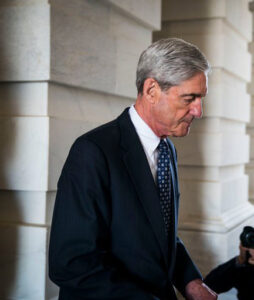by The Cowl Editor on February 1, 2018
National and Global News

by Ernie Andreoli ’18
News Staff
President Donald Trump reportedly ordered the firing of Robert S. Mueller III, the special counsel for the department of justice who is administering the investigation into Russian interference in the 2016 presidential election, last June, according to four individuals familiar with the matter. However, President Trump revoked his decision after White House counsel, Donald F. McGahn II, refused to ask the Justice Department to dismiss Mueller, and threatened to resign.
On Jan. 25, The New York Times published an exclusive article which revealed that President Trump tried to fire the special counsel amid a potential obstruction of justice case. According to the Times’ sources, Mueller became aware of this confrontation after investigators assigned to the Russia probe questioned current and former senior White House officials. Beginning in mid-June, the special counsel widened the investigation to determine whether or not President Trump attempted to obstruct justice by interfering with the judicial system. Prior to this development, the special counsel’s investigation focused primarily on whether the Trump campaign collaborated with the Kremlin.
According to the Times, the president insisted that Mueller had to be dismissed due to three conflicts of interest. First, Trump argued that Mueller, who was a member of his golf course in Sterling, Virginia, and the FBI Director at the time, revoked his membership following a dispute over club fees. Second, the president claimed that Mueller could not be fair because he previously served as a partner at WilmerHale, a law firm that used to represent Jared Kushner, the president’s son-in-law. Third, the president argued that Mueller was interviewed to return to the FBI just days before he was assigned to oversee the Russia investigation. According to the Times’ anonymous sources, McGahn, after becoming aware of the president’s intention, believed that firing Mueller would undoubtedly be interpreted by investigators as a tactic to obstruct the Russia investigation. According to these revelations, Mr. Trump pulled back after McGahn said he would quit.
As the top lawyer for the Trump campaign, McGahn has worked hand in hand with the president on strategic, administrative, and political decisions, such as the firing of James Comey, the director of the FBI, on May 9. “When you are dealing with an obstruction of justice case,” stated Dr. Paul Herron, a political science professor at Providence College, “the issue is intent.” Herron acknowledged that while President Trump had the legal authority to fire Comey, the question at stake is whether or not he dismissed him in order to impede the Russia investigation.
Herron noted that in the obstruction of justice cases with President Bill Clinton and President Richard Nixon, clandestine documents were destroyed and witnesses were told to lie under oath. While it remains unknown by the public whether or not the Trump administration performed either one of these schemes, “President Trump is afraid of something,” stated Herron.
When reporters asked President Trump to comment on these disclosures while attending the World Economic Forum in Davos, Switzerland, the president called the Times’ revelations “fake news.” The president added that the exclusive was “a typical New York Times fake story.” After Ty Cobb, a well-known trial lawyer in Washington D.C., joined the Trump administration’s legal team in July, the president has retreated from criticizing Mueller’s impartiality. According to the Times’ sources, Cobb’s arrival has led to a turning point in strategy—cooperation, not antagonism.
Over the last two weeks, the president’s attorneys have acknowledged that they are currently deliberating with the special counsel’s office to work out an in-person interview with President Trump. There has been no confirmation as to when this inquiry will take place. “We are heading into a political crisis situation,” asserted Herron. By undermining a federal institution like the FBI and validating conspiracy theories such as the belief that the special counsel’s probe is a Democratic-led attempt to sabotage the Trump administration, President Trump’s endeavors “seem a lot like obstruction of justice,” concluded Herron.